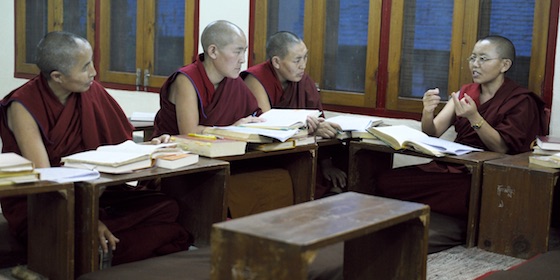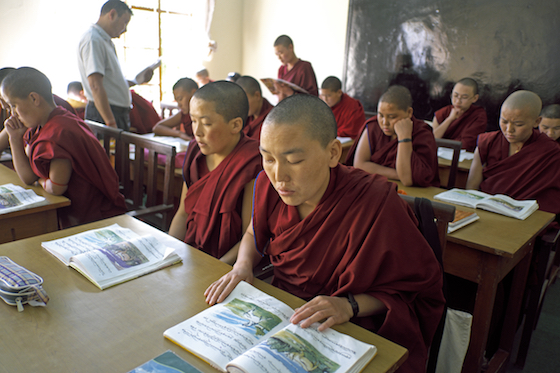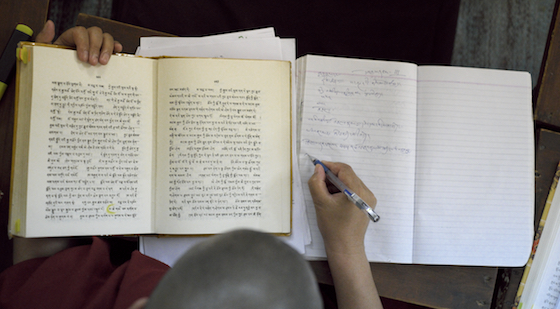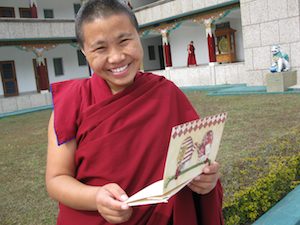The first full week of May is Teacher Appreciation Week in the United States, so we’re taking this opportunity to celebrate the teachers at Tibetan Buddhist nunneries. Springtime is also the start of a new academic year at the nunneries in India so it’s a fitting time to honor the teachers who educate the nuns.
“Educating women is powerful,” says Rinchen Khando Choegyal, Founding Director and Special Advisor for the Tibetan Nuns Project.
“It’s not just about books. It is also about helping nuns acquire the skills they need to run their own institutions and create models for future success and expansion. It’s about enabling the nuns to be teachers in their own right and to take on leadership roles at a critical time in our nation’s history.”

A monk teaches Tibetan Buddhist nuns at Dolma Ling Nunnery and Institute. As more nuns take the highest degrees in their traditions, such as the Geshema degree, they will be qualified to teach. Photo courtesy of Brian Harris
A primary goal of the Tibetan Nuns Project is to assist nuns in reaching the same level of education as the monks.
Because historically nuns have not had access to formal education, very few nuns are qualified to teach. The good news is that the situation is now changing. More nuns are receiving the highest degrees in their traditions.
Who Teaches the Nuns
One of our ongoing tasks is the recruitment of qualified teachers for the various nunneries that we support.
The teachers we employ in the seven nunneries we support are both monastic and lay. Monks (often Geshes and Khenpos) from the large monasteries and training institutes of the various Buddhist traditions teach Buddhist philosophy and debate.
March 2019 marked a big milestone. Two nuns with Geshema degrees were hired to teach Tibetan Buddhist philosophy at Dolma Ling Nunnery and Institute. For the first time, nuns are being taught these topics by other nuns, rather than by monks. This achievement would not have been possible without the global family of supporters of the Tibetan Nuns Project.

Photo of Delek Wangmo and other senior nuns in 2013 by Brian Harris. When she escaped from Tibet she could barely read. Now she is one of two Geshemas hired in March 2019 to teach at Dolma Ling Nunnery and Institute.
English is taught in the nunneries by lay women and men educated in the Indian university system. For the Tibetan language, we employ mostly young women and men who have come from Tibet in recent years. Recent refugees often have stronger Tibetan-language skills than their Indian-raised counterparts. Once they have completed a teacher-training course at nearby Sarah Institute, a branch of the Institute of Buddhist Dialectics, we and many other institutions in the exile community hire them to teach Tibetan language, literature, and grammar.

Teaching a Tibetan class at Geden Choeling Nunnery in Dharamsala. Photo courtesy of Brian Harris
Supporting the Nuns’ Teachers
The ultimate goal is to empower the nuns to become teachers and leaders in their own right and to help preserve Tibet’s unique culture and religion.
In addition to funding the salaries for teachers at the seven nunneries directly supported by the Tibetan Nuns Project, each year we fund the salaries at a number of small nunneries in remote regions.
The annual cost of one teacher’s salary ranges from $1,500 to $5,000, depending on the location of the nunnery and the skills of the teacher, so the total annual budget for this program is approximately $40,000. We are very grateful to all those people who support our Teachers’ Salaries Fund.
What Do the Nuns Study
Each of the four traditions schools of Tibetan Buddhism has its own specific curriculum and degrees attained, but much is shared. All are based on the teachings of the Buddha and the Indian commentaries that developed to explicate them.
Exactly which commentaries the nuns most closely rely on varies between traditions as do the number of years of study, but there is uniformity of the basic topics. All the nuns study:
- Logic and Epistemology, which provide the basic tools for advanced philosophical study;
- Perfection of Wisdom for understanding of the Buddhist path;
- Middle Way for understanding of Buddhist philosophy; and
- Tantra for the final level of teachings.
At most nunneries supported by the Tibetan Nuns Project, courses are also offered in Tibetan language, English, and computer skills, as well as in ritual arts such as sand mandalas and butter sculpture. The smaller nunneries in more remote areas are at earlier stages in the educational process.

A lay teacher at Shugsep Nunnery and Institute teaches geography to the nuns. Photo courtesy of Brian Harris
The Power of Educating the Nuns
Before the Chinese takeover of Tibet, there were at least 818 nunneries and nearly 28,000 nuns living in Tibet.
In an attempt to eliminate Buddhism in Tibet, more than 6,000 nunneries and monasteries were destroyed between 1959 and 1980. Monks and nuns in great numbers were imprisoned, tortured, and forced to give up the ordained way of life. Teaching, study, and prayer were strictly prohibited, and religious texts and objects were demolished.
Before the Tibetan Nuns Project was founded in 1987, there wasn’t much education for Tibetan nuns, either in exile or inside Tibet. “Even when Tibet was free, nuns didn’t have much of an education,” says Rinchen Khando Choegyal. “Of course, we had wonderful nunneries in Tibet, beautiful ones where the nuns were supported by their family members and treated very well, but mostly what the nuns did was spend their time in praying and meditating.”
“I must say that some nuns were very highly realized meditators, but in the sense of education that you and I know of today, they had none,” she said. “Which is why we are so happy that we have been able to make it possible in exile.”

A Tibetan Buddhist nun reads and writes in Tibetan. Most nuns arriving in India had been denied basic educational opportunities in Tibet, including education in their own Tibetan language and Tibetan Buddhist religious heritage. The majority of nuns arrived in India illiterate and unable to write their own names. Photo courtesy of Brian Harris.
“The protection of Tibetan language and its culture is not only about Tibetans in Tibet,” says Karma Tenzin, a research fellow at the Tibet Policy Institute. “A proper access to the rich and profound Buddhist philosophy and epistemology is possible only through Tibetan language.”











